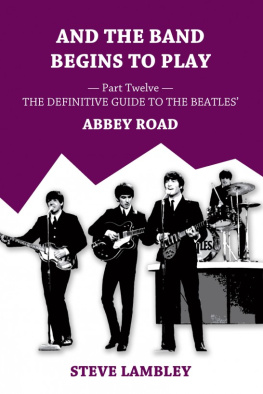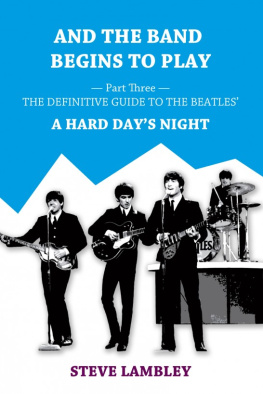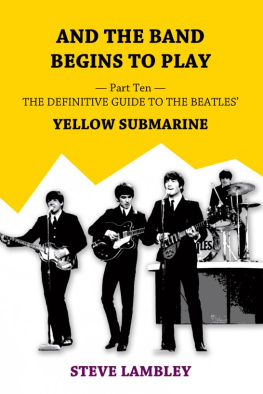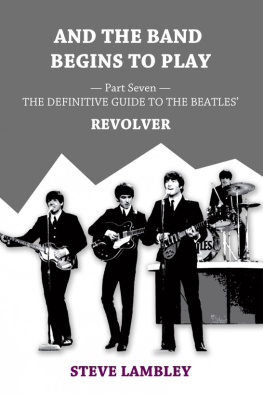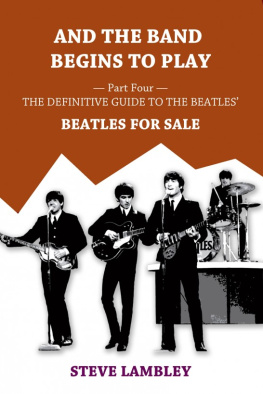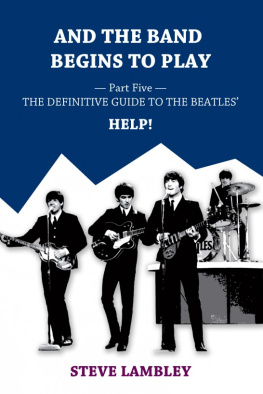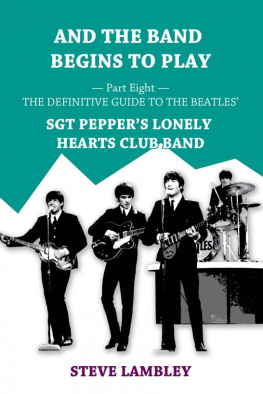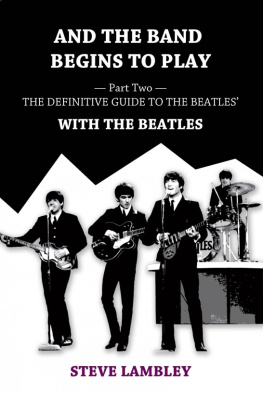BEFORE YOUR FIRST GIG
By Steve Dustcircle
Copyright 2012 by SteveDustcircle
Smashwords Edition
So you want to book a gig? Very cool. Nothingcan be as much fun as playing a live show in front of a crowd.
First, I want you to be realistic. Your crowdcould very well be small. If you were coattail on another bandsbooking, your luck at scoring a show will be difficult, but itsnot impossible. Established bands arent just going to find out ona whim. Youll have to get your name out there, and ask to get on abill.
Before you even think about trying to get ashow, you should have a good set of 25 or 30 minutes of material.Cover songs are okay, and probably even a plus. Cover bands caneven get an opening slot quicker than an original band, but I wouldencourage you to have some good original material written, as well.If you dont have some songs written, learned and solidified, youshould put this book down until you have done so. Reading furtherwould be pointless at this time.
Practice! This first show is going to be animpression on other bands and potential fans. Practice in ourbasement, or wherever else you practice. Know your songs forwardsand backwards. Know the lyrics. Practice your banter. Banter is thedialogue between songs. You never know when something can happen:technical problems, guitar tuning, and the like. You want to havesome stories, jokes, or trivia ready for those down times. Recordthese sets on something cheap for audio, to refer back to. Some ofthe best songs are written spontaneously.
AUDIO VISUAL
Itd be a good idea to have a rough video ormp3 finished of a couple songs. You can do this even on a digitalcamera or camera phone. Upload this video or Mp3 onReverbNation.com, Youtube.com or another site that you plan onhaving music and video content. This will be what youll privatelysend to venues or bands where you wish to book a show at.
Settle on a band name. Research the name andmake sure its not taken. Design a professional-looking logo (dontsteal one). Do your logo in 300dpi (dots per inch) and making onesquare or slightly rectangle, and the other more of abanner/header. Remember what font you used, and keep various stepsof your design saved separately. Trust me; itll come into handlater.
If you lack photography or graphic designskills, find a friend or amateur to do it for you for free orcheap. Youll have good-looking photos and logos, and theyll havesomething extra to put in their portfolio.
Take a few fun band photographs, both bandphotos and individual photos. Watch your background in thepictures. Only have behind you what you want others to see, whetherits a plain light or dark back drop, or fun scenery.
ONLINE IDENTITY
Establish online presence. First, make a bandemail address. Then, sign up for band (not personal)accounts on Facebook.com, Myspace.com, ReverbNation.com,Twitter.com, Youtube.com, and wherever else you will want to putband material on. Think futuristically: Figure out where youllwant to be in a few years, and work towards that when establishingthese band profiles. Make sure the profiles are as you want them toappear, with a professional look. Only then, should you startinviting others to fan or follow you.
Sync up these profiles. Link them uptogether, and place links to each of the profiles on the others.Remember your passwords. Have a way to remember them, and onlyshare this with one other band member, if at all. I have heard ofbands that will have a disagreement and one member will go onto theprofiles and either change passwords or delete content. You dontwant this to happen to you, even if you have the data saved to yourcomputer (MP3s, photos, logos, etc.).
At this point, youll also want to find otherwebsites that focus on band development and music marketing. Manyof the posts will be beyond where youre at career-wise, buttheres lots of good information out there. I try to put the bestof all that was available on my own websitea sort of, GreatestHits of Others. Join any mailing list you can find that has to dowith the music industry, band marketing, artist development, musicbusiness, etc. Also, Like all relevant Facebook pages, and followsuch helpful organizations on Twitter.
Friend them on Myspace, and friend theirfriends. It will take a lot of time, but itll get your nameknown.
INDENTITY
Figure out what your sound is. This is notyour influences. While you may want to sound like aparticular artist or band, how you actually sound is a completelydifferent thing. Decide on the genre you fit in, choose how youddescribe your sound, and think of 2 or 3 combined bands or artiststhat you can compare yourselves to. I say combined because youdont want to sound exactly like any other band, but its veryacceptable to be considered a musical mash-up between Band A andBand B, with a vocal touch of Band C. This will help you describeyour sound to people who havent heard you play yet.
Before you play in front of people, watchother performances. I mean, really watch them. For example,Youtube.com and Vimeo.com has tons of video footage from earlyNirvana performances. Or look at intimate footage of bands that youenjoy. Hear the music, yes, but also watch the performance. What dothe band members do? How do they interact? What banter do they use?How do they flow from one song to another?
NOT THE VENUES
Okay, youve settled on a band name and logo,set up online presence, recorded a few raw tracks, and maybe a fewhere and theres. But youre still not ready for the gigs. The lastthing you want to do is play a show or two and develop a badreputation for yourself as being inexperienced.
Now you play basement shows. Invite yourclose friends, your family and girlfriends (or boyfriends) to yourbasement gigs. Garage shows, also. Playing with your band membersis one thing; playing in front of people is a differencescenario.
Make these free concerts. Have snacksavailable. People like to go where the food is. Guys like to gowhere the girls are. Invite everyone you know well enough, butcount on only a fraction of them showing. You want to be realistic,but hope for the best. Maybe 90% or more will show. You neverknow.
Have your set list ready. Introduce your bandby band name. Thank the people for coming out to your first gig, astheyre witnessing history, if your band happens to go somewheredown the road.
Start out with an energetic song. Continue onto another faster-paced song. Then go into a ballad or lighter songthats heavy on the words. Flowing well from song to song is acrescendo.
Play hard, play accurate. Interact with theattendees. Mingle afterward.
Mistakes will happen. Most wont notice, butif theres a huge blunder, overlook it. The last thing you want todo is break the momentum. The importance is getting used to beingin front of people. Once youre in front of people you know, itmight be easier to play in front of strangers. Personally, for me,playing in front of more people is easier than a small crowd. Thisis, because you dont have too many faces to focus on. But this isdifferent for every performer. Some like a more intimate crowd,where they can look into the eyes of each fan.
At least before your set and after the set,mention your band name. Its a good idea to mention your name afterevery couple of songs, but dont get too wordy. End a song, say whoyour band is, and jam into the next song. Keep the flow going.Watch how the people are reacting to each song. Note to yourselfwhich songs they seem to have liked, and which songs cause peopleto go take a smoke break. Dont be offended if people wander in andout of the room. Sometimes they just need to run to the bathroom,or make a quick call.
After the set, mingle with the people.Personally, I like to get away for a minute or two. Hit thebathroom, get a breather. But interacting is very important. Peoplewill offer you feedback. If you did well, theyll let you know. Iftheyre happy, they want to share it.
Next page
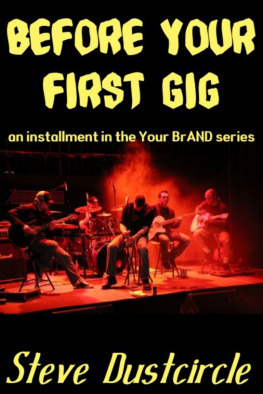
![Lambley - And the Band Begins to Play: [Part9 The Definitive Guide to the Beatles White Album]](/uploads/posts/book/213743/thumbs/lambley-and-the-band-begins-to-play-part9-the.jpg)
![Lambley - And the Band Begins to Play: [Part6 The Definitive Guide to the Beatles Rubber Soul]](/uploads/posts/book/213742/thumbs/lambley-and-the-band-begins-to-play-part6-the.jpg)
![Lambley - And the Band Begins to Play: [Part1 The Definitive Guide to the Beatles Please Please Me]](/uploads/posts/book/213741/thumbs/lambley-and-the-band-begins-to-play-part1-the.jpg)
